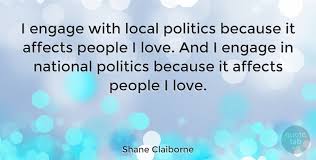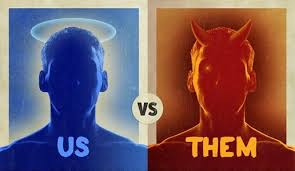What do we want from our politicians? What forces drive them. Which of those do we want to be dominant?
We have just had an election in Australia. The Labor Party put forward a detailed social justice agenda. They lost. The Liberal Party had two policies. Tax cuts for all, and the Labor Party is a danger to economic stability. The Liberals won. So is greed the greatest driver for our elections? Should the driving force for each politician be the greed of the electorate? For every decision, do we want our politicians to decide on what will put the most dollars and cents in the pocket of the electorate?

In reality, there are multiple, usually conflicting forces on the politicians. They do not respond to only one force. It is interesting however to look at it from their perspective and try to understand the forces they need to reconcile, and why they move one way or the other.
Party v Individual
Unless a politician votes with their party they quickly find themselves banished to the back bench and fighting to be selected at the next election. Is this a good thing?
Imagine the opposite. What if every party politician could follow their conscience. We would have a rabble rather than a parliament. There could be no certainty for a government and nobody could be Prime Minister because nobody could guarantee support all the time. It is unworkable.
Many politicians over the years have had to support something they did not believe in because it was the party line. In fact, if we see dissent in the ranks of a party, it is seen as a sign of weakness. Of disunity. We condemn the party and vote them out of office. It is us, the voters, who say Party trumps individual views.
Local v National
A great example of this is the proposed Adani coal mine in Queensland. The locals want the mine because it brings them jobs. The city electorates largely oppose the mine on environmental grounds. Labor sat on the fence saying they would not support it, but follow whatever decisions were made by regulatory bodies. They were wiped out in Queensland country electorates.

It is said that a politician is elected to represent the view of his electorate. So what should the Queensland Labor candidates have done? Stand up for the view of their electorate or take a more national view and support the environmental stance?
Once again, it comes down to making a choice between conflicting views. Even within a single electorate, there can be people who feel strongly about particular views. How does a politician reconcile conflicting views when deciding how to vote?
Short v Long Term
Elections are held every three or four years. Taking action has to show some results in that period. Assume I have a choice. Sink a billion into a local rail line, or start a ten year project to build a fast train. When I come up for re-election in three years which is the best for my chances. Is it a new rail line, or a business plan for the new fast train?
In decades gone, we had the Public Service to do the long term planning. It was staffed by people who spent their whole life in one area be it weapons, weather or water. They know the history. What worked, and what didn’t. The pitfalls and the traps for inexperienced practitioners. They did long term planning. Ten or twenty years. The politicians came and went, and had little impact on the long term direction.
Those days are gone. One Public Servant said to me it is now a case of a new minister, new direction. A new minister has barely sorted out the resource restructure, changed the letterhead and they are gone. So each department is being driven by a minister who wants to look good in three years.
Imagine this. What if a politician was elected for ten years. There are obvious downsides, but the decisions they take would certainly be different.
Capital v Labour
Capital versus labour is the basis of our western democracy. One side represents the business owners and the other side, the workers. How much is a politician pulled between the two? While it is sometimes preordained by the party they represent, there are still decisions that pull the person in two directions.
An example may be where a Liberal politician who works in a party that believes that the market should be able to run itself, is faced with a decision about regulating the market. What do I expect them to do? They were elected because the favoured the capital end of the spectrum, but in that vague grey middle ground, What should we expect?
Probably the best we can expect is that they will go with the values we believed they had when we elected them. Is hypocrisy a bigger sin than changing their support to align with a view not consistent with their natural position? One more aligned with our view or perhaps even opposed to our view.
Us v Them
This is an area where in many cases what people say, and what they do are opposite. Do you think we should increase taxes to ensure we get better schools, hospitals and transport? Of course, I do. These areas need extra funding. I just won’t vote for the party that proposes increased taxes. Don’t believe me? Look at our recent election. Part of the reason Labor lost was new taxes.

So does greed triumph all? Probably. Remember that it is not the majority that needs to be swayed to win an election. It is 10% to 20% in the middle who swing from one side to other in each election. They make the difference when it comes to which side wins. That is not to say others are not influenced. I once read some research on party support. One woman said she voted for a party because they always gave more money to her family. I am sure she is not in the minority. Others are just more candid.
The conclusion you would draw as a politician is that greed, if not good, will get you elected. Don’t blame the politicians for taking advantage of what people want. That is only the symptom. The problem is that many people feel that governments are rated by how much money they give me. The concept that governments redistribute money is lost. Somehow they feel governments create money and hand it out to them.
Conclusion
I asked the question “What do you want from your politician?” Do you want them to focus on their party directives or individual views? Local or National issues? Short or long term? Capital or labour? Us or them? Those are only a few of the conflicting forces. There is also the loud minority or the silent majority, the rich versus the poor, those born here or immigrants, men or women. The list could go on forever. The answer to the question is probably to mix those forces differently for every issue that comes across their desk.
In spite of this we criticise them for being too party driven, or too short term or too concerned about pleasing the greedy. The answer is that it is complicated like most things in life. If you were to step into the shoes of a government minister you would be pulled in the same direction.
“I want to increase investment in schools. Build a few new schools but it is against our party policy, it is long term expenditure and nothing will be achieved for five years and it will not help me get re-elected. If I am not in power, the opposition will kill it off and the money spent to date will be wasted. Best to splash it in my local electorate and build a new sporting stadium. It will keep me in power and I can do some other good things.”
What would you do?